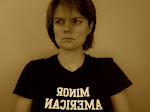Dear Minor Americans,
Several weeks ago I pulled Larry Eigner off my shelf. I haven't read his work in a couple of years, but he's someone I return to for comfort. This time while reading his Selected Poems I really *got* them in a way that I hadn't before. I could see much more going on with them. I was finally ready for Larry. (Incidentally, I truly believe this about books. You can't hear certain books until something in you is ready to hear it. There are several books on my shelf I'm not ready to read yet. Or the feeling you get at a reading hearing a poet read a poem you've heard her read before and you think she's revised it because it's so much better but really you can finallly hear it after for some strange reason being deaf to it for so long.)
In my new found enthusiasm I started looking Eigner up on the web and noticed that Robert Grenier was someone who had edited Larry's work. (Why I'm writing Larry I don't know, I never met him.)And for some reason I thought this was very strange because in my mind I only held certain memories of Grenier's work from "In the American Tree." And I held some idea of him being a radical poet because he had written Sentences, separate poems written on index cards. And I thought to myself what would Grenier want to do with someone like Eigner, who writes about trees and birds? And so instead of going back to In the American Tree and re-reading to undo my prejudices, I thought to myself, I'll get an early book of Grenier and this will help me understand the connection. So on the web I found Dusk Road Games (poems, 1960-66)and when I finally got it in the mail I was blown away. The poems were such Poems. They had no radical artifice and the content of each poem had usually to do with some domestic scene. The connection to Williams was obvious. And then I thought to myself, where did I get this idea that Grenier was such a radical? And I realized at that moment that what I mean by radical when I use it in relationship to poetry is that there is no relationship between writing and observation -- or the type of rendering their work achieves is not directly connected to a visual observation -- they're not sitting on the porch looking at the sky. And then I realized that so many of the Language Poets are really nature poets in a sense. Certainly Grenier and Silliman. And it's their choice of form for their observations that stops people from seeing their work this way. Or at least it stopped me for a while. Bernstein and Andrews don't fall into this category and they were my first idea of Language Poetry. Their work is a kind of language play that has little to do with observation of the daily world in the way that a Williams poem does. That's not to say their work doesn't deal with a social world. It deals with it through an appropriation of rhetoric, politcal and otherwise. But after getting to Grenier through Eigner and then hearing Silliman, I though, how funny to think of LANGUAGE POETS as Nature Poets. I couldn't see the trees through the form for such a long time.
-- Minor American
Monday, October 18, 2004
Subscribe to:
Post Comments (Atom)


1 comment:
Now why do you think I moved to Tredyffrin?
Post a Comment